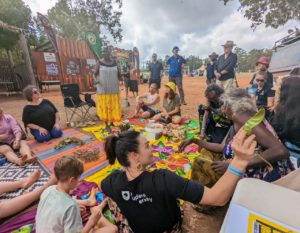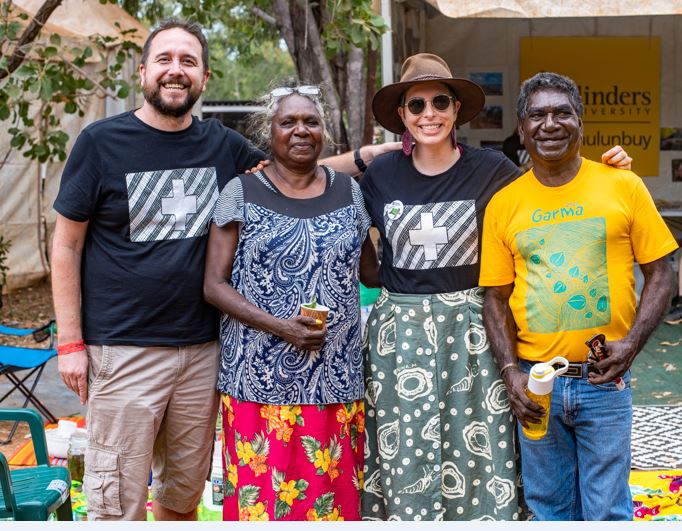
In the words of Gumatj Elder Murphy Yunupingu: Nhamirri bukmak – how are you all?
Under the stars of the Milky Way, on the lands of the Gumatj people thousands gathered to learn and respect Yolŋu culture.
Song, dance, art and storytelling are staple features of the Garma Festival held just outside of Nhulunbuy at Gulkula.
The word Garma – is Yolŋu for gathering, and as Mr Yunupingu explains Garma was the first, and continues to be “parliament for Yolŋu”.
“Garma was attended by the Yolŋu clans right across East Arnhem Land,” Mr Yunupingu says.
“That’s where the Garma word came from.
“The Garma is not new to us.
“Our ancestors created the Garma, calling every Yolngu nation across East Arnhem, blowing the yidaki on one of the escarpments out at Gulkula.
“Where Garma is today, was exactly done the same before by the Yolŋu people.”
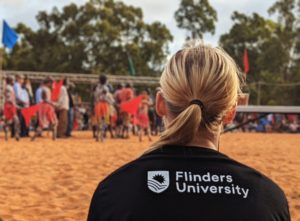
Gulkula lies in Northeast Arnhem Land a short one and a half hour flight from Darwin or a 12-hour car trip down a corrugated, and often flooded Central Arnhem Road.
The Garma Festival held last weekend attracts thousands of people from all walks of life from politicians to people living in Northeast Arnhem Land, including Flinders University staff and students.
It is an ideas festival, a chance to listen to and learn from Aboriginal people as much as it is a cultural festival – both facets are eye-opening and enriching.
Mr Yunupingu says the festival is about celebrating Yolngu culture but also showing how Yolŋu people work in multiple languages, and in two worlds – and the struggles that can come from it.
Mr Yunupingu welcomed the Prime Minister of Australia the Hon Anthony Albanese to Garma -painting his face with yellow ochre for the first bunngal (ceremony). The yellow ochre represents the Gumatj people who the Traditional Custodians of the lands where the festival is held.
As well as being an Elder, Mr Yunupingu is the Flinders University Senior Cultural Advisor in Nhulunbuy.
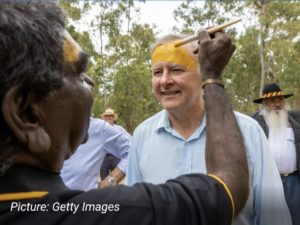
Flinders University has a campus out at Nhulunbuy where research, and education is undertaken.
Mr Yunupingu says the students who complete placement out in East Arnhem Land are vital towards addressing medical issues that affect Yolŋu people.
“Health is the most valuable resource to the community in East Arnhem Land,” explains Mr Yunupingu.
“Flinders university students have been very helpful.”
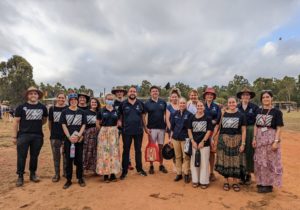
Flinders University was represented at Garma by about 30 staff and students, including but not limited to Professor Jonathan Craig, Executive Dean College of Medicine and Public Health; Professor Robyn Aitken, Dean Rural and Remote Health; Professor James Smith, Deputy Dean Rural and Remote Health NT; Professor Billie Bonevski, Professor in Public Health; Professor Ray Mahoney, Head of Population Health; Associate Professor Simone Tur, Pro Vice-Chancellor (Indigenous); and Dr Richie Fejo, Senior Elder on Campus.
Professor James Smith who has attended Garma once before in 2016 says the festival provided cultural exposure and learning opportunities.
“It was a wonderful opportunity to connect with the Yolŋu community, and see students and staff engage in genuine two-way cultural learning,” Prof Smith says.
“Flinders has been supporting the education and training of the health and medical workforce in the NT for more than 25 years.
“This includes a campus in Nhulunbuy where we work closely with the local Yolŋu community.
“This was a culturally enriching experience for everyone that attended. I hope Flinders continues its engagement with Garma in the coming years.”
Flinders Campus in Nhulunbuy is run by a small and dedicated team who put together a booth at the four-day festival to share the work being undertaken in Nhulunbuy and across the Northern Territory.
Health-based students on placement in the region also attended the festival and helped at the stall.
“The stall provided an opportunity for students on placement in Nhulunbuy from medical, nursing and allied health backgrounds, and some Flinders staff and alumni, to provide bi-cultural health education with those attending,” he says.
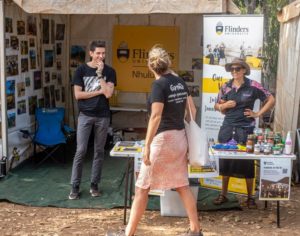
Nhulunbuy-based Senior Lecturer in Rural and Remote Health Dr Phoenix Smith said the Garma Festival was an overwhelming display of goodwill, strength, and pride, as the Yolŋu nations generously shared their traditional and modern culture and knowledge.
“Attending Garma meant that Flinders was able to share some of the work that we are doing with the broader community,” Dr Smith said.
“We were privileged to have our Senior Cultural Educators and Advisors – Mr Murphy Yunupingu, Ms Mayilil Marika, Ms Lipaki Dhamarrandji, Ms Wayalwanga Marika and their families teach two detailed Yolŋu medicine education sessions at the Flinders stall with medicine collected by our students under their guidance.
“We were proud to be able share with the community a glimpse of the two-way and cultural proficiency training students experience whilst on placement here, learning from our Flinders Yolŋu teachers.”
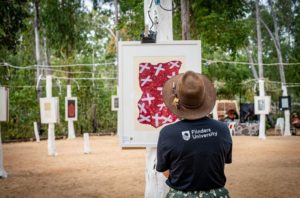
Dr Smith said Flinders had provided clinical placements in East Arnhem Land for more than 15 years; and during that time listening to the community and developing connections. Flinders graduates are well represented in the current health workforce in the region, with six Flinders doctors based in Nhulunbuy alone at the time of the festival.
“Garma was an opportunity for Flinders to become more deeply embedded in the community that Flinders Nhulunbuy already proudly calls home. And I am so grateful for that opportunity,” Dr Smith says.
